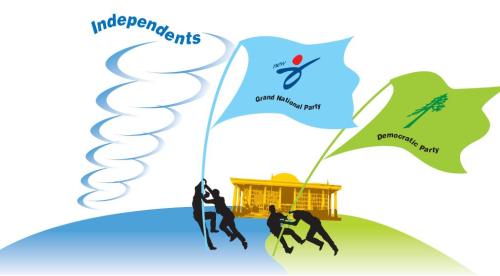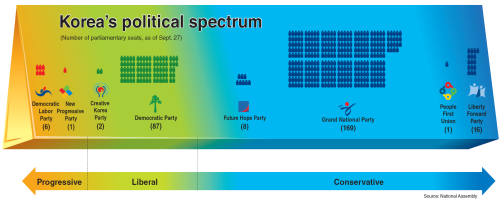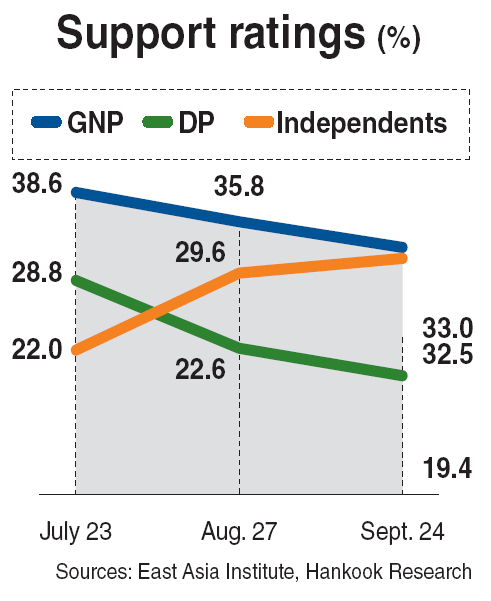
Rival parties pressed to overhaul themselves as independent voices rise
Lawmakers of the ruling Grand National Party and the main opposition Democratic Party met separately at the National Assembly last Wednesday morning to discuss their final positions on the nominee for Supreme Court chief justice. Opposition members had boycotted the vote in previous weeks, demanding the ruling party withdraw its objection to a lawyer sympathetic to North Korea becoming a Constitutional Court justice.
In their meeting, GNP legislators decided to push for a vote. When they were gathering for the vote at a parliamentary session hours later, DP lawmakers also filed into the chamber.
GNP members became tense, bracing for another scuffle with DP legislators who seemed poised to block the process. There was a buzz in the ruling party’s bloc when DP leader Rep. Sohn Hak-kyu took the podium.
What he said surprised GNP lawmakers. Sohn said his party members were present in the session to join the vote, not block it. He then asked for cooperation from the ruling party in electing the opposition-recommended candidate as new Constitutional Court justice at an early date.
“The disappearance of politics is a misfortune for the nation. We should restore party politics,” said Sohn, apparently mindful of mounting public criticism of the long partisan standoff over the top judicial appointments. Before leaving the podium, Sohn bowed deeply to GNP lawmakers, who remained silent.
In the following vote, most of the DP members joined their GNP colleagues in approving President Lee Myung-bak’s nomination of former Supreme Court justice Yang Sung-tae as new chief justice.
Sources from the rival parties later said Sohn had held a secret meeting with his GNP counterpart Rep. Hong Joon-pyo the night before the vote.
“The two leaders had candid talks and agreed to save party politics from drifting further away from public sentiment,” said a DP official, requesting anonymity. What was discussed at the meeting, proposed by Sohn, appeared to have led him to make the concession to break the stalemate, the official said.
Hong was said to have told Sohn his party might consider helping the DP’s nominee for Constitutional Court justice pass a parliamentary vote if the opposition party cooperated in approving Yang. After Wednesday’s vote, Rep. Park Jun-seon of the GNP said Sohn’s speech led many ruling party members, including himself, to be more flexible on approving the opposition-recommended candidate, who sparked controversy with pro-North Korean remarks during his confirmation hearing.
An official at the National Assembly secretariat said the leaders of the rival parties had set a rare example of what politics should be like at a time when public distrust toward existing parties is so deep that some non-politicians have been emerging as alternatives to the political establishment.

Nonpartisan surge
Giving credit to Sohn for guiding his party to the vote, local media said the fact that his decision to follow parliamentary procedure drew such favorable responses showed how abnormal the country’s party politics has become. Many observers note that the DP’s changed attitude reflects a sense of crisis that has engulfed political circles since the depth of public distrust in existing parties was revealed early this month when entrepreneur-turned-professor Ahn Cheol-soo hinted he would run for Seoul mayor.
Conservative Mayor Oh Se-hoon resigned in August after a referendum on free school meals was scuttled due to a low turnout. In the ensuing polls, voter support for Ahn soared to more than 50 percent, dwarfing approval ratings for potential candidates from both the ruling and opposition parties. Ahn later stepped back, throwing his support behind lawyer-turned-civic activist Park Won-soon, who saw his approval rating rise from 5 percent to more than 40 percent following Ahn’s endorsement.
Further rocking the major parties, the renunciation of his mayoral bid led Ahn to emerge as a strong potential presidential candidate despite his reserved stance on whether to enter the political arena. A series of polls placed him level with frontrunner Park Geun-hye of the GNP and far ahead of other presidential hopefuls including DP leader Sohn.
The spectacular rise of the 50-year-old professor reflects voters’ frustration with a political establishment preoccupied with partisan wrangling, analysts say.
“The deepening public distrust in exiting parties is behind the enthusiastic support for Ahn,” said Kim Yong-jick, professor of political science at Sungshin Women’s University in Seoul.
Partly attributed to his integrity and ability shown in his career as medical doctor, anti-virus computer software developer, entrepreneur and professor, the “Ahn Cheol-soo syndrome” is pushing the existing parties to overhaul themselves.
According to a recent poll by Hankook Research, 44 percent of voters agreed on the need for the creation of a new party. Nearly half of DP supporters wanted to see a new party to be formed, while 29 percent of GNP backers did so. More than half of voters who do not affiliate themselves with any existing party supported the idea.
A series of surveys by the polling firm showed the proportion of nonpartisan voters increased from 22 percent in July to 29.6 percent in August and 32.5 percent in September. The support rates for the GNP and the DP declined from 38.6 percent and 28.8 percent to 33 percent and 19.4 percent over the period.

“The results should be taken as a serious warning to the whole political circles,” said Jeong Han-wool, head of the Center for Public Opinion Research at the East Asia Institute, which commissioned the polls.
The prevailing nonpartisan sentiment has led civic leaders running for Seoul mayor, including Park Won-soon, to shun being tied to the major parties in the primary, while agreeing on the candidacy unification with party runners at the last stage.
The shift in public sentiment dealt a more painful blow to the main opposition party, which had been buoyed by the prospect of its win against the ruling party in the parliamentary and presidential elections next year on the strength of its victories in last year’s local polls and the by-elections in April. Political observers indicate what the “Ahn Cheol-soo syndrome” means is that people dislike what the ruling party has done but still attach no credibility to the main opposition party as its alternative.
“Under a normal circumstance, the opposition should have benefited from the poor popularity of the ruling party,” said Jeong.
“But what we see now is that the main opposition party is losing more of its supporters than the ruling party.”
Aspiration for changes
The driving force behind the political change, analysts note, is voters in their 20s and 30s, most of whom have no party affiliation. Parties have failed to address their concerns such as jobs, education costs, housing and child care.
“The generation is not ideologically biased and have interests in practical matters,” said professor Kim.
“The existing parties, locked in partisan confrontation, do not appeal to them. For younger voters, the parties remain ‘their parties,’ not ‘our parties,’” he said.
Ahn is regarded by them as a figure who can address their concerns and realize their aspiration for changes. He has aligned with neither side of the political divide and placed common sense ahead of ideology, saying he is conservative on national security and liberal on economic issues. This attitude cannot be defined by conventional political standards but appeals to an increasing number of nonpartisan voters.
Some observers note the nonpartisan whirlwind carries a call for a new paradigm to replace the current political structure, which has held voters hostage to regional confrontation and ideological strife.
The existing political order originates from the situation in the late 1980s when the military-backed dictatorial regime collapsed after a long pro-democracy movement. The general elections in 1988 resulted in the establishment of a four-party system based on regional support. Two years later, the then-ruling Democratic Justice Party merged with the two parties led by pro-democracy leader Kim Young-sam and Kim Jong-pil, a conservative politician who masterminded the 1961 military coup that took Army general Park Chung-hee to power. The merger of the three parties alienated the party headed by Kim Dae-jung, a life-long partner and rival with Kim Young-sam in their decades-long struggle against the dictatorial rule. To overcome this isolation, Kim Dae-jung courted liberal and progressive civic leaders, adding an ideological dimension to the party.
Since then, party politics have been framed by regional confrontation matched with ideological conflict between the major political forces. The ideological rift was widened as Kim Dae-jung began pushing for a policy of engagement with North Korea after his presidential inauguration in 1998. While his party, based on support in southwestern Jeolla provinces, backed the policy, the largest opposition group with a stronghold in southeastern Gyeongsang region opposed it.
The party born from the merger of the three political groups ― the Democratic Liberal Party ― was later reinvented into the New Korea Party and then the Grand National Party, which took back power from a decade of liberal rule with the election of its presidential candidate Lee Myung-bak in 2007. Kim Dae-jung’s National Congress for New Politics, which was formed in 1995, was eventually succeeded by the main opposition Democratic Party. Kim Jong-pil bolted from the merged party in 1995 to launch the United Liberal Democrats based in the central Chungcheong region, from which the Liberty Forward Party, the most conservative splinter party, originates.
Creation of new party
Many observers see the possibility of a new party being formed in the run-up to the key elections next year. “A new party can be created by the demands of time,” said professor Kim.
“If lacking ideas and identity, any existing party can be deserted by the people.”
What draws most attention from political circles and analysts is whether Ahn will move to form a new political group that could support his possible presidential bid. Many politicians admit such a party could change the political landscape by drawing moderate supporters from both the conservative and liberal parties. But some analysts doubt whether the professor would go so far as to launch his own party.
No matter what Ahn’s course of action may be, the existing parties are required to discard their vested interests and strengthen efforts to recruit new competent figures to ensure their own survival in the rising tides of change. If they are reluctant to, or fail in doing so, some analysts warn that the existing parties will accelerate their destruction and invite forces outside the political arena to take their place.
Many political commentators note it is not desirable for nonpartisan sentiment to hold sway over the political scene. Despite some of their problems, they say, the parties are still important institutions in democratic society to nurture political leaders and envision and implement policies for the future.
By Kim Kyung-ho (khkim@heraldm.com)



No comments:
Post a Comment